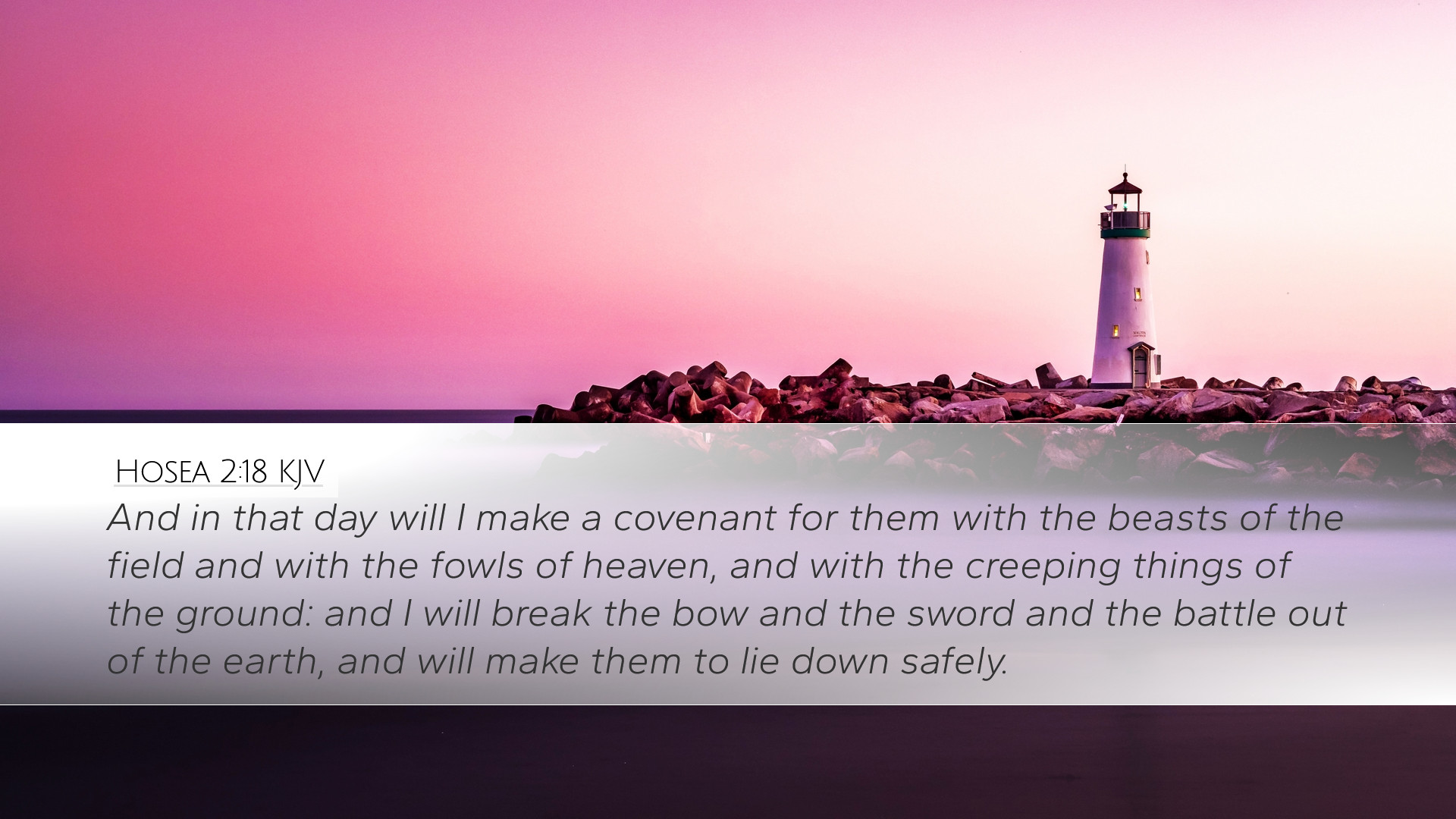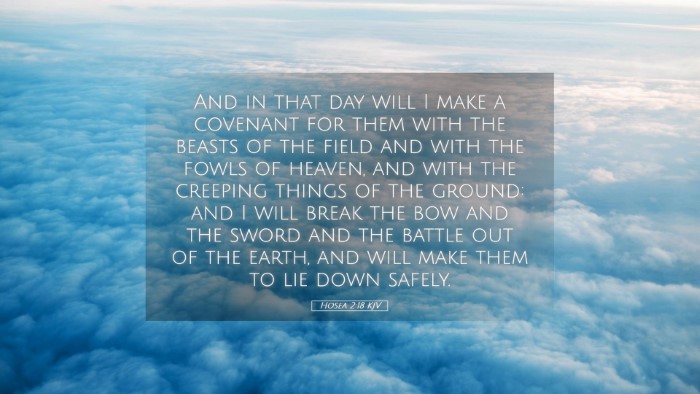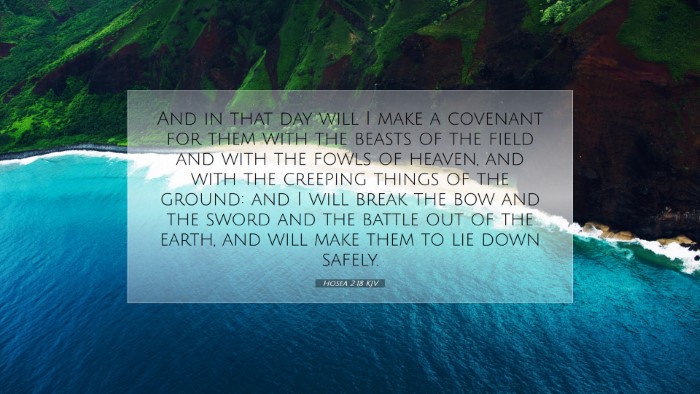Old Testament
Genesis Exodus Leviticus Numbers Deuteronomy Joshua Judges Ruth 1 Samuel 2 Samuel 1 Kings 2 Kings 1 Chronicles 2 Chronicles Ezra Nehemiah Esther Job Psalms Proverbs Ecclesiastes Song of Solomon Isaiah Jeremiah Lamentations Ezekiel Daniel Hosea Joel Amos Obadiah Jonah Micah Nahum Habakkuk Zephaniah Haggai Zechariah MalachiHosea 2:18
Hosea 2:18 KJV
And in that day will I make a covenant for them with the beasts of the field and with the fowls of heaven, and with the creeping things of the ground: and I will break the bow and the sword and the battle out of the earth, and will make them to lie down safely.
Hosea 2:18 Bible Commentary
Commentary on Hosea 2:18
Hosea 2:18 states: "And in that day will I make a covenant for them with the beasts of the field, and with the fowls of heaven, and with the creeping things of the ground: and I will break the bow and the sword and the battle out of the earth, and will make them to lie down safely."
This verse is rich in theological implications and offers a profound insight into God’s redemptive purposes, particularly in the context of His relationship with Israel. The verse can be unpacked to reveal themes of peace, restoration, and divine covenant.
Historical Context
Hosea prophesied during a turbulent time in Israel's history, marked by moral decay, idolatry, and impending judgment. The nation had turned away from God, leading to divine displeasure. In this context, God uses Hosea's prophetic ministry to call His people back to faithfulness and to assure them of His everlasting love and mercy.
Divine Covenant
The Covenant With Creation: The phrase "I will make a covenant for them with the beasts of the field..." indicates a restoration of harmony in creation. It suggests that God's redemptive plan extends beyond humanity and includes all creatures. This metaphorical expression showcases God's intention to return creation to its original state of peace, reminiscent of the tranquility present in the Garden of Eden before the fall of man.
Matthew Henry notes that the covenant speaks of "the beasts of the field" which symbolize safety and peace. In a time where Israel faced threats from military powers, this imagery serves to assure them that God's intervention brings an end to violence and hostility.
The Promise of Safety
Breaking the Instruments of War: "I will break the bow and the sword and the battle out of the earth..." illustrates a promise of peace. God declares that He will remove the instruments of violence, affirming that His plan includes establishing a time where conflict and strife will be eradicated. Adam Clarke emphasizes that this promise of peace is rooted in God’s covenants and His faithfulness to those covenants.
The cessation of warfare allows God’s people to "lie down safely," which implies not only physical safety but also peace of mind—resting assured in God's protective care. Albert Barnes points out that this is indicative of the ultimate peace brought about through the Messiah, who Himself fulfills the promises of safety and restoration.
Theological Implications
This passage underscores the comprehensive nature of God’s covenant love. Within the biblical narrative, God's covenants often serve as a basis for understanding His relationship with humanity. The security provided through these divine promises is reinforced throughout Scripture, culminating in the New Testament with the establishment of a new covenant in Christ.
- God's Sovereignty: The text emphasizes God’s sovereign authority over all creation. His ability to establish peace and safety reflects His power to control not just human affairs, but also the natural world.
- Restoration and Redemption: Hosea’s message is one of hope. Despite Israel’s sin and rebellion, God offers a path to restoration. This dual theme of divine judgment and grace is critical, reminding us of God's consistent character as both just and merciful.
Application for Today
For pastors, students, and theologians, this passage offers significant application. It invites an examination of how we perceive God's involvement in both personal and communal life. Reflecting on our society today, marked by conflict and unrest, the promise of peace resonates deeply.
Encouragement for the Faithful: Hosea’s declaration can serve as an encouragement for contemporary believers. Just as Israel was assured of God’s commitment, modern-day Christians can find solace in the permanence of God's promises.
A Call to Responsibility: Furthermore, believers are called to reflect God’s covenant love in their own interactions with creation and each other. This involves advocating for peace and justice, mirroring the divine intention for harmony laid out in Hosea.
Conclusion
Hosea 2:18 stands as a testament to God's faithfulness and His commitment to restoration. By understanding the depth of God’s covenant and the implications of peace, believers are reminded to trust in His sovereign control over their lives and the world. This verse urges a return to faithfulness and a commitment to live out the implications of God’s promises in every aspect of life.


